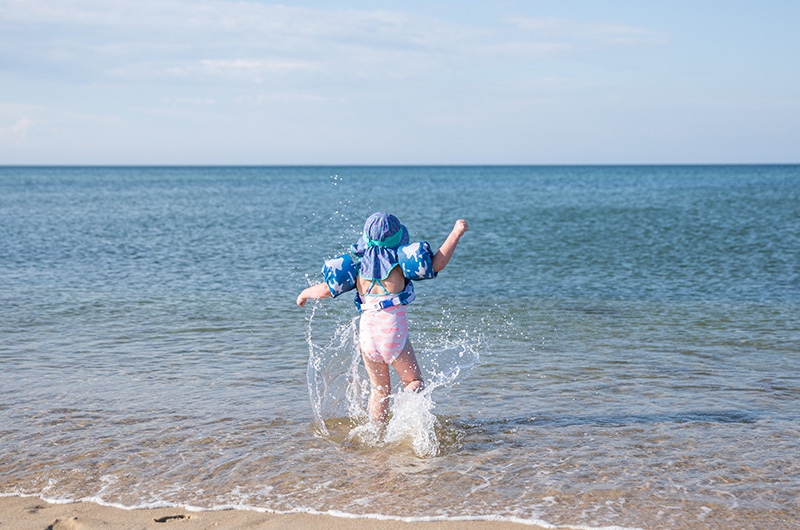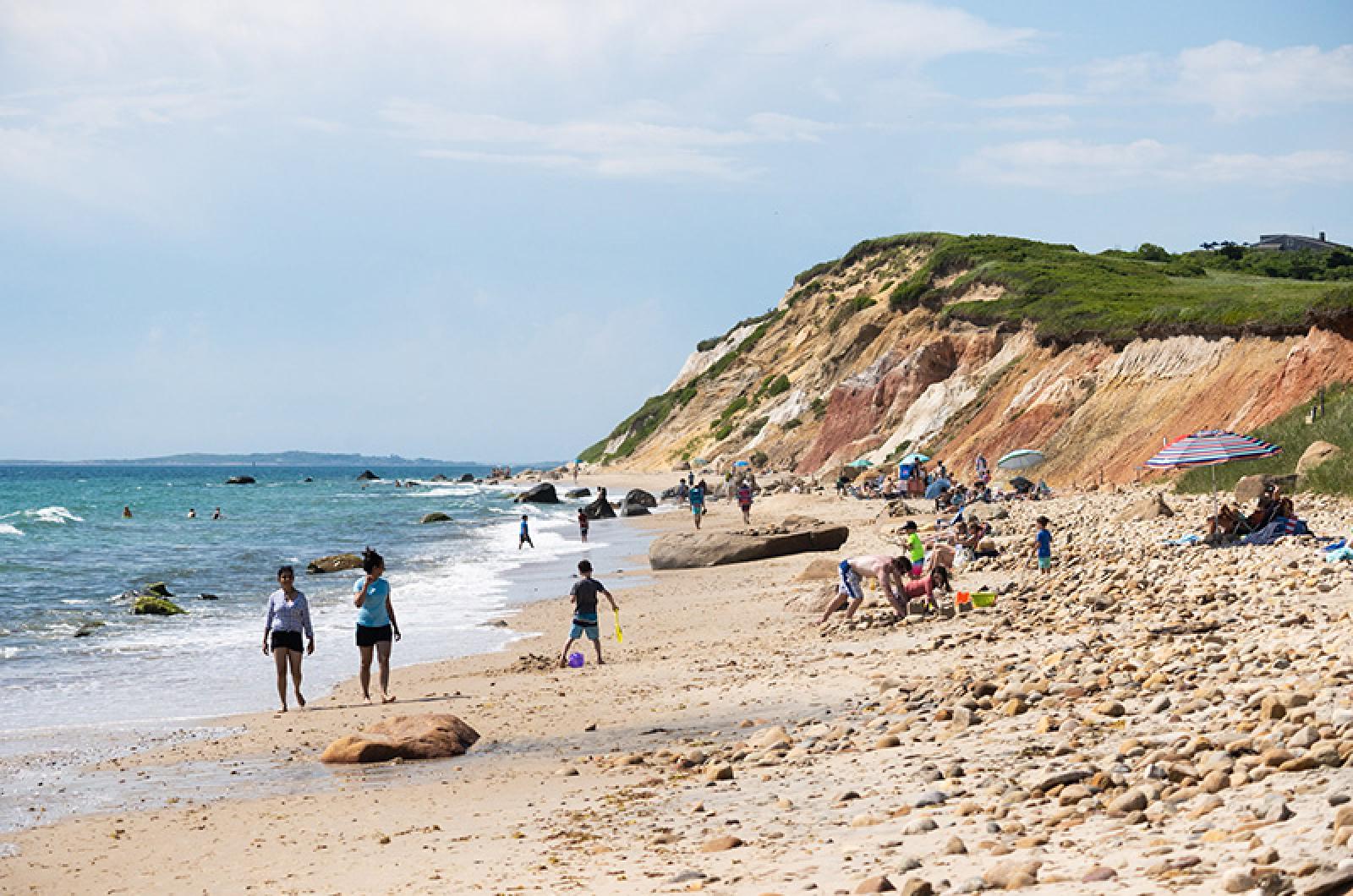High summer is here, and thousands are flocking to Island beaches.
But the already-large crowds and potential for even bigger ones over the July Fourth holiday weekend has many Vineyard officials on edge, as the pandemic turns a simple, traditional rite of summer — beach-going — into yet another new frontier to navigate.
“Absolutely, we’re concerned, as is every seasonal beachside community in eastern Massachusetts,” said Edgartown town administrator James Hagerty this week. “We’re trying to do what we can with the people we have, and the amount of resources we have to have a safe summer.”
Although the state has literally drawn 12-foot lines in the sand to promote social distancing regulations at all beaches, requiring masks upon entrance and exit and limiting parties to 10 people or fewer, local regulations remain varied and complex.
While the three down-Island towns decided not to limit parking or capacity at most of their beaches or go beyond state protocols, citing a variety of logistical complications and enforcement issues, up-Island towns and The Trustees of Reservations, a conservancy that owns and manages beaches around the Island, have taken more dramatic measures to limit capacity.
Town officials also said this week that enforcement of any regulation has proven difficult or futile. Photographs taken on a sunny Saturday in late June showed crowds all along South Beach and cars lining the five-mile stretch along State Beach between Edgartown and Oak Bluffs, without a parking spot in sight.
Masks are not required for sunbathers or swimmers, according to the state guidelines, as long as social distance can be maintained.
Mr. Hagerty said Edgartown, and most communities on the Island, participated in a Zoom call with state officials and Cape Cod town managers regarding beaches in the region. He said none of the Cape communities or down-Island towns were planning to restrict parking or go beyond the state guidelines, even though limiting parking is allowed.
“We just don’t have the capacity to block off certain areas of parking,” Mr. Hagerty said.
In a follow up call, administrative assistant for the Edgartown parks department Jessica McGroarty said that the pandemic had prompted the parks commission to keep a section of parking at right fork closed for the summer. Ms. McGroarty estimated that the closure blocks off approximately 100 spaces.
"We were going to open it, but the beaches were crazy [busy]," Ms. McGroarty said.
Mr. Hagerty hopes that once Norton Point reopens, it will alleviate some of the crowding on South Beach and State Beach. The beach is currently closed to protect nesting shorebirds.
“When Norton Point is not open, it stresses everything,” Mr. Hagerty said. “Hopefully that’s going to help the through-put and alleviate the situation.”
Dukes County administrator Martina Thornton said the county, which manages the Joseph Sylvia State Beach fronting Nantucket Sound, cannot limit parking along the road because it is a state highway. She said the county has posted signs spelling out state guidelines, but more restrictive measures would be impossible.
“I think that the restrictions from the state are pretty strict,” Ms. Thornton said. “And I don’t think that people are even adhering to those. So how would you make it more strict than those?” She added: “It’s for people to voluntarily adhere to. There is no enforcement.”
Ms. Thornton said she has advertised for a beach patroller but has received no applicants.
In Oak Bluffs, parks and recreation committee chairman Amy Billings said the town decided not to hire its usual slate of lifeguards for town beaches this summer.
“We would need way too many,” Ms. Billings said.
But up-Island officials have taken a slightly more aggressive approach. While down-Island beaches are open to the general public, scenic beaches in West Tisbury, Chilmark and Aquinnah require passes and parking permits, making it easier to regulate the quantity of beachgoers.
Cutting parking spaces has been the first step. At iconic Lucy Vincent beach in Chilmark, the town chose to slash the number of spots from 140 to 75. Similar steps were taken at Lambert’s Cove Beach, where the town reduced parking spots from 35 to 17. And at the head of Moshup Trail in Aquinnah, 300 parking spots have been reduced to 75.
Town administrator Jeffrey Madison said the town increased the parking fee by $5 so as to further avoid overcrowding.
The Trustees, which own and operate beaches at Long Point Wildlife Refuge, Wasque and Cape Pogue Wildlife Refuge, plan to limit parking at their beaches as well. Parking passes are required for members and non-member visitors alike.
In Chilmark, beach committee chairman Martina Mastromonaco said while the number of beach passes available to residents for purchase has not been reduced this summer, beach staff at Lucy Vincent, Squibnocket and Menemsha have put admission restrictions in place to avoid overcrowding that include assessing the capacity of each beach based on factors like the number of cars in the lot, the density of people on the beach and the position of the tide at various times during the day.

And for the first time this summer, the beach committee has also put into place a new “beach closed” policy for when the beach becomes overcrowded. In this case, the gates will close to all cars, bikers and walk-ons all waiting lines will be prohibited — and will not reopen until the beach thins out.
But in the end, both Mr. Madison and Ms. Mastromonaco said the responsibility to use the beach safely will fall to the individual.
“We’re depending on people to be socially responsible and hope that they will be,” said Mr. Madison. “There may be an occasional patrol there . . . for public safety . . . [But] we’re not going to send the police down on the beach to tell people what they can do.”
Others are taking more direct approaches to enforcement. In West Tisbury, beach managers are monitoring town parking lots and beach areas to ensure that visitors are complying with social distancing guidelines. In Chilmark, the duty has fallen to the lifeguards, and at a recent selectmen’s meeting, town officials even posited hiring a “social distance ambassador” to enforce regulations in Menemsha.
Ian Peach, land superintendent for the Martha’s Vineyard Land Bank, said enforcement and parking limitations were already built in at land bank-owned beaches. The usual staff of property attendants will be stationed on location to help keep safety measures in check, playing primarily an educational role, he said.
But as summer comes into full swing, beach operators up-Island also expressed worries about a sustained influx of people this year.
Ms. Mastromonaco said by her estimation, June has been significantly busier this year than previously, despite — or perhaps because of — the pandemic.
“Everybody needs to be concerned, this is no joke,” she said. “I’m not on vacation, I work here and I have a lot of employees that I’m responsible for. Their health and their safety is, right up there, number one.”
Of course, Vineyarders have long abided by the time-honored Island tradition of going to the beach to socially distance. Officials just want to make sure they remember that this year, it’s required.
“I don’t think [rules are] going to get any looser. It may have to get tighter,” said Ms. Mastromonaco. “Everyone’s really . . . hoping that the people that do visit the Island [this summer] can respect how hard we’ve all worked to get to this point."
The article has been corrected to reflect a decision by the Edgartown parks department to keep a section of parking along South Beach closed.








Comments (11)
Comments
Comment policy »